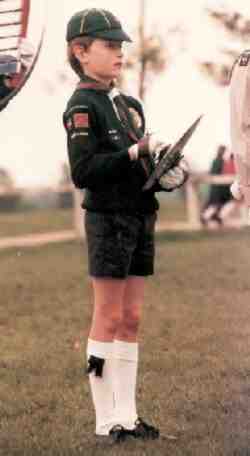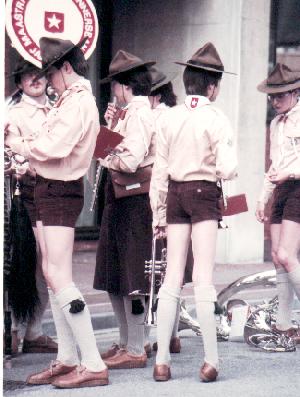
Scout Bands

Figure 1.--Scout band participants always dress up in their best uniforms. Some of the Cubs even wear white kneesocks and gloves to add a dressy touch to their uniform standard dress iniform. This in accordance with BSA regulations allowing Scout Bands the option of
wearing white accoutrements as additional items, such as white belts, white gloce, and white kneesocks as a part of the Band uniform.
|
|
Background
One popular activity for British Scouts are Scout band competitions. I know this is popular in England. I'm
not sure about the rest of Europe or other countries. Foreign Scout bands do occasionally compete in the English
competitions which are a popular summer activity for Scouts. Cubs and Guides participate along with the
Scouts. The British Scouts still give considerable to the uniform and the participating Scouts, Cubs, and guides
go over ever detail of their uniform.
Uniform
One important element in Scout band competitions is the uniform. Participants, both boys and girls, dress
very carefully to present the best possible appearance for their group. The appearance of the uniform is one of
the areas in which the band is judged. The ban members wear the dress Scout uniform. English bands, however,
add a few formal touches to the dress uniform.
Countries
Scout band appear to be particularly popular in England. Bands have, however, been formed in some other
countries, mostly other European countries. A few foreign Scout bands also participate in the English Scout band
competitions. I am not sure if the have Scout band competitions in their own countries or if the just come to
England for the competitions.
HBU has no information on Belgian Scout bands. HBU notes, however, that the Flemish youth organization
VNJ has bands. I do not know if the participate in Scout band competitions, but they do participate in their own
music competitions like Zangfeest. While HBU has little information on Belgium, in part because of the language
problem, information from the VNJ does mention local Scout bands.
HBU has little information on Canadian Scout bands. I'm not sure if Scout bands were formed in Canada
like England and the United States. HBU knows of no current full Canadian Scout bands. There is at least one
active Scout pipe band that perform in a kilt uniform.
Britain is one of the few places in Europe where the Scouts still insist on full uniforms. The Scouts, Cubs,
and Guides participating in the band competitions give great attention to dress as their appearance is one element
in the competition. The boys make sure their trousers and shorts have a sharp crease and their shoes well
shined. The mothers and Scout leaders go over each participant carefully to make sure every last detail of the
uniform is just right. The participants wear the regular dress uniform with a few added touches. Some Bands all
wear white gloves. The shoes are always black and smartly polished. Often the Cubs wear white gloves and
kneesocks, although some Cubs compete in the normal grey kneesocks.
France
No information available yet on French Scout bands. This seems strange as the French have such a large
and influential Scout movement.

Figure 2.--This Dutch Scout band participated in the English Scout band competition.
|
|
I'm not sure how popular Scout bands are in the Netherlands. The authors have noted one Dutch Scout band participating in English Scout band tournaments, but do not know how common bands are in Dutch Scouting groups. This has proven a very difficult topic to research. Dutch Scout internet sites do show that Scout groups do have bands an participate in competitions. Unfortunately as the sites are all in Dutch, it is difficult for HBC to obtain much information from them.
American Scout groups formed bands in the 1920s and 30s. Some were quite large. I'm not sure whether this was following the British example or not. Probably school bands were not as common at the time as they are now. In more recent years I have noted only a few Scout bands. American Scout bands even when they did exist did not have band competitions like English Scouts. Many U.S. Scout units, however, have drum and bugle
corps.
The drum major is the leader of the band. The term begins to appear in the English language about the beginning of the 19th century. I'm not precisely sure how it was derived. Many English Scout bands had drum majors. He would be the only band member dressed differently than the other band members. I don't recall seeing all of the Scout bands with drum majors, but many had them. The drum majors were usually Scouts. One
band had a Cub. I don't call seeing Guide drum majors.
Competitions
English Scout hold biannual band competitions in the summer. I'm not sure just when the competitions
began. They attract bands from all over the United Kingdom as well as a few European Scout bands.
Groups
Scout bands vary in their compositions. English bands are composed of Cubs, Scouts, and Guides. Most of the bands are English. This requires some coordination because the Scouts and Guides are different organizations. British Scouting, unlike many European groups, still separates boys and girls. Curiously while Cubs participate along with the Scouts and Guides in English bands, there are very few brownies. American bands were only Scouts. For some reason American Boy and Girl Scouts rarely cooperated, unlike British Scouts and Guides. There were also no Cubs. American Scout bands were created in the 1920s before Cubing. The one Dutch band known to the authors was all Scouts.
Other Organizations
While Scouts are not the only organization to have organizational bands. While the Scouts have the largest number of bands, other groups also have formed bands.
Boys' Brigade
HBU does not yet have details, but some Boys' Brigade bands are know to exist
Chiro
HBU has very limited information on Chiro. There does, however, appear to be some Chiro bands.
Universally recognized as one of the largest and finest musical bodies in the world of Youth Military Bands, the National Band of the Church Lads' & Church Girls' Brigade have been providing musical support for any type of occasion since 1979. Their repertoire
covers a wide category of music, including jazz, pop, light concert music, and the big band sound, as well as the very popular marches, and always to the highest standard.
HBU has no information on Belgian Scout bands. HBU notes, however, that the Flemish youth organization VNJ has bands. I do not know if the participate in Scout band competitions, but they do participate in their own music competitions like Zangfeest. While HBU has little information on Belgium, in part because of the language
problem, information from the VNJ does mention local Scout bands.
HBU

Navigate the Historic Boys' Uniform Chronology Pages:
[Return to the Main chronologies page]
[The 1900s]
[The 1910s]
[The 1920s]
[The 1930s]
[The 1940s]
[The 1950s]
[The 1960s]
[The 1970s]
[The 1980s]
[The 1990s]
[The 2000s]
Navigate the Historic Boys' Uniform Web Site:
[Activities]
[Biographies]
[Chronologies]
[Countries]
[Essays]
[Garments]
[Organizations]
[Religion]
[Other]
[Introduction]
[Bibliographies]
[Contributions]
[FAQs]
[Questions]
[Unknown images]
[Boys' Uniform Home]
Navigate the Historic Boys' Uniform Web organizatiion pages:
[Boys' Brigade]
[Camp Fire]
[Church Lad Brigade]
[Hitler Youth]
[National]
[Pioneers]
[Royal Rangers]
[Scout]
Created: November 15, 1998
Spell cheked: December 26, 2003
Last updated: December 26, 2003




